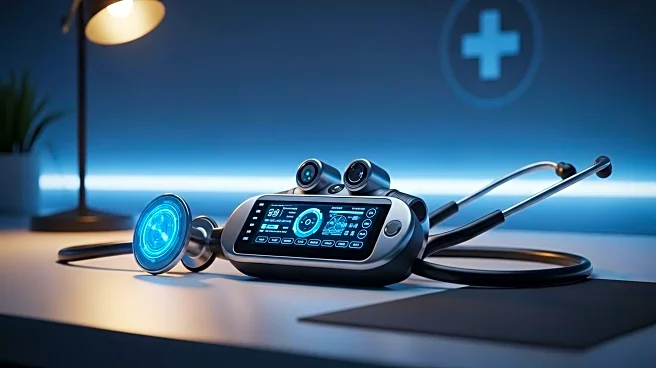What is the story about?
What's Happening?
Eko Health, a California-based company, has developed an advanced AI-enabled stethoscope capable of diagnosing major heart conditions within 15 seconds. This innovative device, about the size of a playing card, is designed to detect heart failure, heart valve disease, and abnormal heart rhythms by analyzing electrical signals and blood flow sounds from the heart. The AI stethoscope sends this data to the cloud for analysis, providing results that can identify subtle heart issues often missed by human examination. The device was trialed on approximately 12,000 patients in the UK, showing a significant increase in early diagnosis rates for heart conditions compared to traditional methods.
Why It's Important?
The introduction of AI technology into medical diagnostics represents a significant advancement in healthcare, particularly for early detection of heart conditions. This development could lead to earlier interventions, potentially saving lives and reducing healthcare costs by preventing severe complications. The AI stethoscope offers general practitioners a powerful tool to diagnose patients more efficiently, which could transform patient care by enabling timely treatment. However, there is a risk of false positives, which necessitates careful application of the technology to symptomatic patients rather than routine checks.
What's Next?
The AI stethoscope is expected to be integrated into more healthcare settings, potentially expanding its use beyond the UK. As the technology gains acceptance, it may prompt further innovations in AI-driven medical devices. Healthcare providers and policymakers will need to address regulatory and ethical considerations, ensuring that the technology is used responsibly and effectively. Continued research and trials will likely focus on refining the AI algorithms to minimize false positives and enhance diagnostic accuracy.
Beyond the Headlines
The deployment of AI in medical diagnostics raises important ethical and privacy concerns, particularly regarding data security and patient consent. As AI technologies become more prevalent, there will be increased scrutiny on how patient data is managed and protected. Additionally, the shift towards AI-driven diagnostics may influence medical training and the role of healthcare professionals, necessitating new skills and approaches to patient care.
















